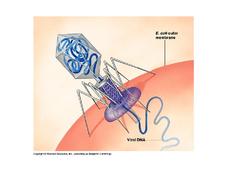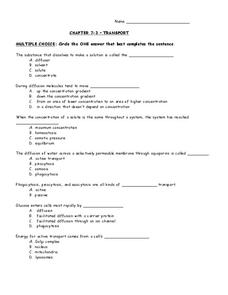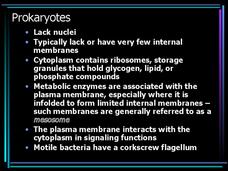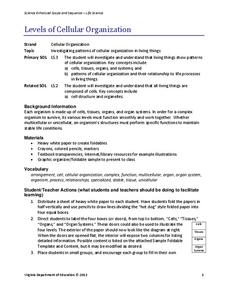Curated OER
Organelles
Young scholars explore the functions of major eukaryotic organelles. They compare and contrast prokaryotic and eukaryotic cells. Given diagrams and drawings, students take turns drawing structures, discussing their function, and...
Bonneville
Engaging with Solar Panels
Build a fan and become a fan of solar power. The second of 14 lessons in the Cost Effective Solar Cells unit has learners first construct circuits with solar cells to power a fan, a motor, and an LED. They then test their circuits both...
Curated OER
viruses
No title page for this presentation about single-celled processes and gene recombination means that your class would jump into a set of slides full of relevant and detailed information. There are many labelled images and diagrams,...
Curated OER
Human Reproductive System
Teenagers take on the human reproductive systems when viewing this presentation. Labeled diagrams of each are displayed, along with one of a fetus in utero. Presented in bullet-point fashion are facts about the formation of sperm and egg...
Curated OER
DNA Replication
Students create a model of DNA and simulate replication with their models in an activity that uses licorice, colored marshmallows, and toothpicks. Students also label a diagram of replication and indicate major parts of the DNA molecule.
Curated OER
Typical Animal Characteristics
How is an animal formed? Scientists use a diagram to examine early post-fertilization stages, and the creation of the blastula. They look at a second diagram to observe the transition from the blastula to a gastrula. Three comprehension...
Curated OER
Transport
A multiple-choice quiz about the transport of substances between cells, this would work well as a pretest and/or post-test. It refers to chapter seven of an unnamed textbook, but it is a Word document, so it can easily be edited.
Curated OER
DNA Technologies
After giving some of the basic characteristics of the DNA molecule, the slides provide process information and many detailed diagrams about plasmids, vectors, and their application in cloning genes.
Curated OER
Animal Nutrition
Use this great overview to give information on all aspects of nutrition. By working their way through this PowerPoint, students review a lot of information about the digestive process. Students read many facts on a number of...
Curated OER
Prokaryotes
Although these slides are text rich, the summaries of prokaryote characteristics will be useful. There are diagrams of preferred cell conditions and your students will find all the basic definitions of structure and functions...
Curated OER
Human Skeleton
Promote reading comprehension and practice naming parts of the human skeleton with this online interactive worksheet! Scholars read about the functions of the human skeletal system, then work online to label a diagram by filling in 18...
Curated OER
Integumentary System: A System, An Organ, the Biggest!
It is only six short slides, but an acceptable outline of the integumentary system. General facts about the system, layers, sublayers, and functions are listed as bullet-points. What would make this presentation more engaging for your...
Curated OER
A Little More Advanced Biotechnology Tools: Better Plasmids
A nice set of information that will help your students understand the process of using recombinant plasmids. DNA hybridization and blotting mechanisms help illustrate expressed genes and the concepts behind the Human Genome Library....
Curated OER
Functions of Leaves
The title is a little deceiving since only one of 17 slides is dedicated to the function of leaves, while the rest is dedicated to the structure. Both internal and external structure is taught with accompanying diagrams. If you are going...
Curated OER
Plant Growth
Examine the growth regions and tissues in plants. The structures and specialized areas of roots, stems, and shoots are defined and supported with diagrams and pictures. Your class will also learn the details of specific growth...
Curated OER
Aerobic vs. Anaerobic Respiration
Students define aerobic and anaerobic respiration. They compare and contrast the processes of aerobic and anaerobic respiration. Students identify organisms that use the processes of aerobic and anaerobic to synthesize energy from food.
Curated OER
Metabolism Test Review
In this metabolism test review, students define several terms. Students write balanced chemical equations for aerobic cellular respiration. Students complete several multiple choice questions.
Virginia Department of Education
Levels of Cellular Organization
What an eccentric way to learn about each level of cellular organization! Allow emerging biologists to utilize white paper and create their own foldable charts to describe each level of organization in the body. You may also adapt the...
Nuffield Foundation
Interpreting an Investigation of Plant Hormones
How important is the tip of a new shoot on a growing plant? Individuals learn about the results of experiments on shoot tips and must interpret them. They apply previous learning and connect complex ideas through advanced analysis.
Curated OER
Nervous System
Are you nervous about teaching the nervous system to your beginning biologists? Worry no more! This PowerPoint provides a note-taking guide and diagrams of the neuron and the brain. Viewers will walk away with a clear...
Manitoba Education and Early Childhood Learning
Forensic Sciences: A Crime Scene Investigation Unit
Mr. Bergman has been murdered and we need you to solve the crime! The cross-curricular unit covers 11 different types of forensic science and includes 17 activities. Scholars perform blood type analysis, blood spatter analysis,...
Curated OER
Logic
In this geometry worksheet, 10th graders investigate and solve various logic problems including the constructions and use of two way tables and Venn diagrams to assist in problem solving. The eleven page worksheet contains nine...
Curated OER
Operation Anitbody
Students identify the types of cells that are important in the immune system. They investigate the different mechanisms used by white blood cells as they protect the body from foreign invaders. Students are given five case studies,...
Curated OER
Viruses
In this viruses worksheet, students will read the 5 steps of the lytic cycle and then label those steps on a diagram starting with the virus attaching to a cell and ending with the cell opening and releasing the replicated viruses.
Other popular searches
- Plant Cell Diagram
- Eukaryote Cell Parts Diagram
- Blank Plant Cell Diagram
- Blank Cell Mitosis Diagram
- Eukaryotic Cell Diagram
- Sperm Cell Diagram
- Diagram of a Plant Cell
- Eukaryote Cell Diagram
- Prokaryotic Cell Diagrams
- Unlabeled Plant Cell Diagram
- Bacterium Diagram of Cell
- Composite Cell Diagram

























